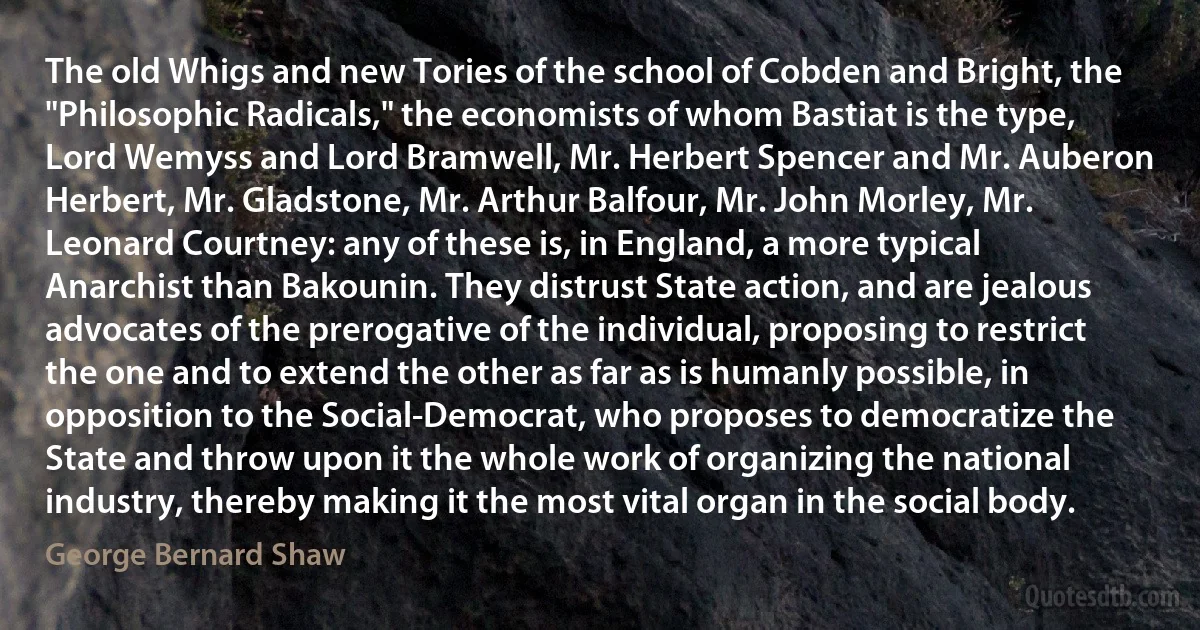
The old Whigs and new Tories of the school of Cobden and Bright, the "Philosophic Radicals," the economists of whom Bastiat is the type, Lord Wemyss and Lord Bramwell, Mr. Herbert Spencer and Mr. Auberon Herbert, Mr. Gladstone, Mr. Arthur Balfour, Mr. John Morley, Mr. Leonard Courtney: any of these is, in England, a more typical Anarchist than Bakounin. They distrust State action, and are jealous advocates of the prerogative of the individual, proposing to restrict the one and to extend the other as far as is humanly possible, in opposition to the Social-Democrat, who proposes to democratize the State and throw upon it the whole work of organizing the national industry, thereby making it the most vital organ in the social body.
George Bernard ShawRelated topics
action anarchist body bright far gladstone industry john lord making national possible prerogative school spencer state throw tories typical vital work leonard herbert whigsRelated quotes
What should be the profession of faith of a sound but reasonable Imperialist? He will not be possessed with any secret desire to see the whole of Africa or of Asia painted red on the maps. He will entertain not only a moral dislike, but also a political mistrust of that excessive earth-hunger, which views with jealous eyes the extension of other and neighbouring European nations. He will have no fear of competition. He will believe that, in the treatment of subject races, the methods of government practised by England, though sometimes open to legitimate criticism, are superior, morally and economically, to those of any other foreign nation; and that, strong in the possession and maintenance of those methods, we shall be able to hold our own against all competitors.

Evelyn Baring, 1st Earl of Cromer
Oh, that we had our eyes more and more steadily fixt on the risen Savior! Oh, that we could ever be learning more and more from Him to breathe out blessing, as He did when He imparted His Spirit to the disciples! Oh, that we were more and more learning like Him to encourage the foolish and slow of heart to joyful faith in the divine promises, to active obedience to the divine will of their Lord and Master, to the glad enjoyment and use of all the heavenly treasures that He has thrown open to us! Oh, that we were ever speaking more effectively to all connected with us, of the kingdom of God and of our inheritance in it, so that they might see why it was necessary for Christ to suffer, but also into what glory He has gone! These are our desires, and they are not vain desires.

Friedrich Schleiermacher
The peculiarity of this strike...has been that a great number of separate trades, which have nothing to do with one another...have shown that they intend to make common cause. You may depend upon it that this is a social fact of the highest importance and of very general importance of the future. I believe that the lesson has been learnt from Ireland, and that it is due to the present Government and to its coercive laws in Ireland, and to the necessity which they have laid upon the people of Ireland in different parts of the country which have no connexion with one another to associate together for an object which they believe to be vital to all. I am much inclined to think that the working men of London have learnt this lesson from Ireland.

William Ewart Gladstone
Noiselessly Kerchak entered, crouching for the charge; and then John Clayton rose with a sudden start and faced them.
The sight that met his eyes must have frozen him with horror, for there, within the door, stood three great bull apes, while behind them crowded many more; how many he never knew, for his revolvers were hanging on the far wall beside his rifle, and Kerchak was charging.
When the king ape released the limp form which had been John Clayton, Lord Greystoke, he turned his attention toward the little cradle; but Kala was there before him, and when he would have grasped the child she snatched it herself, and before he could intercept her she had bolted through the door and taken refuge in a high tree.

Edgar Rice Burroughs
The gospel freely admitted makes a man happy. It gives him peace with God, and makes him happy in God. It gives to industry a noble, contented look which selfish drudgery never wore; and from the moment that a man begins to do his work for his Saviour's sake, he feels that the most ordinary employments are full of sweetness and dignity, and that the most difficult are not impossible. And if any of you, my friends, is weary with his work, if dissatisfaction with yourself or sorrow of any kind disheartens you, if at any time you feel the dull paralysis of conscious sin, or the depressing influence of vexing thoughts, look to Jesus, and be happy. Be happy, and your joyful work will prosper well.

William Wilberforce
